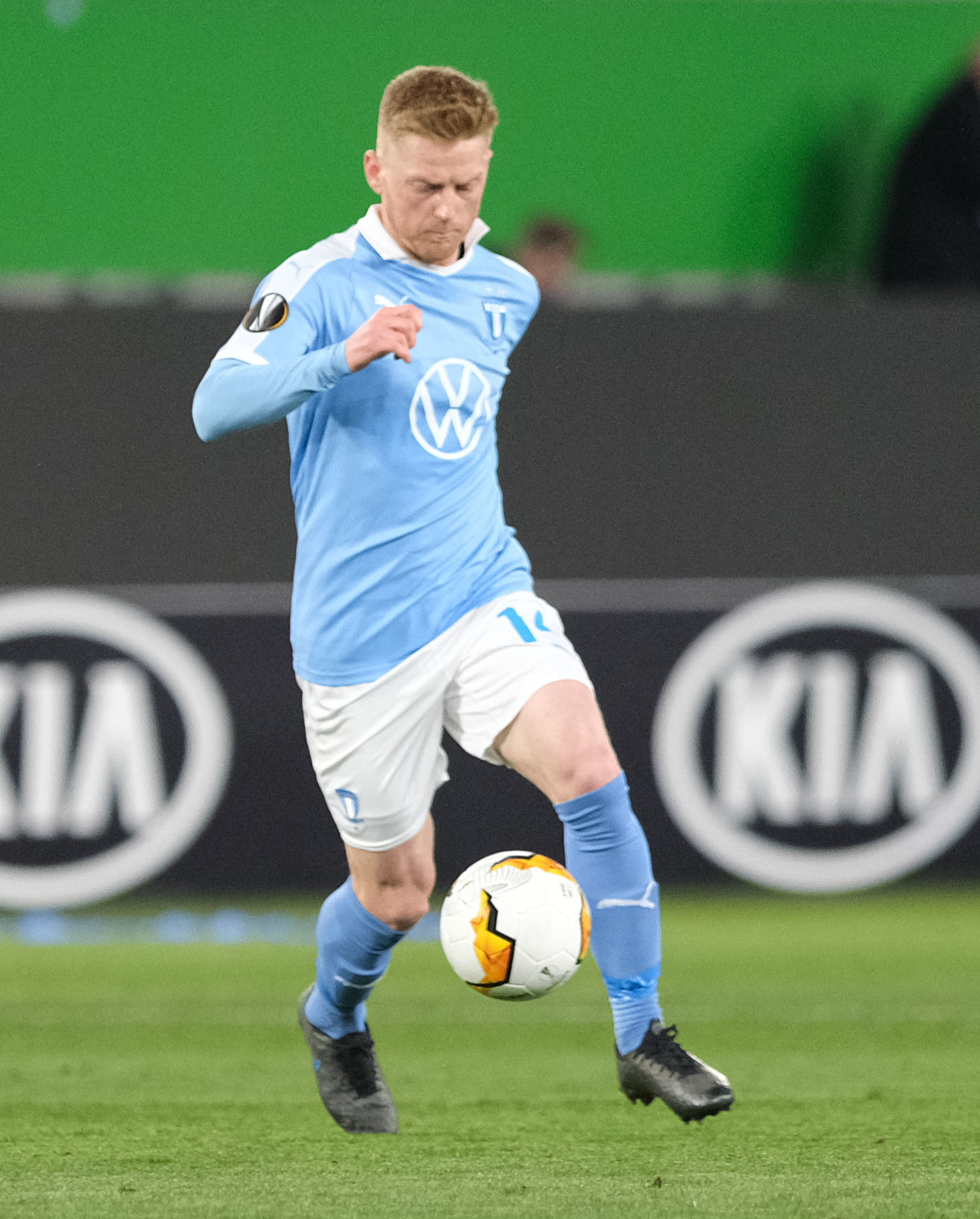After the 2019 Allsvenskan season ended in dramatic fashion - Djurgårdens taking the title from Malmö and Hammarby by a single point on the final day, after coming from 2-0 down to draw 2-2 - the 2020 edition had a tough act to follow.
IFK Norrköping were quickest out of the blocks, going 6-2-0 in the opening eight rounds to build a strong lead at the top of the table. Talismanic forward Christoffer Nyman and tricky winger Sead Hakšabanović – eventual top scorer and top assist maker in the league - were dovetailing to great effect at the top of the pitch, with support coming from an unlikely source in centre back Rasmus Lauritsen, responsible for 3 goals and 3 assists in the opening period of the season.
Jens Gustafsson and his team were aiming to go one better than their 2018 title challenge and the early underlying numbers suggested they were on their way to doing so: the Östergötland-based club had the best expected goal difference across the league after eight games. This was largely thanks to an attack that had notched 18 goals (plus 2 penalties) from 13.38 xG, an expected goals figure that was league-best at the time.
However, as we can see from their expected goals trendline, the team were unable to maintain their strong early-season form. As performances dropped off, so did results.
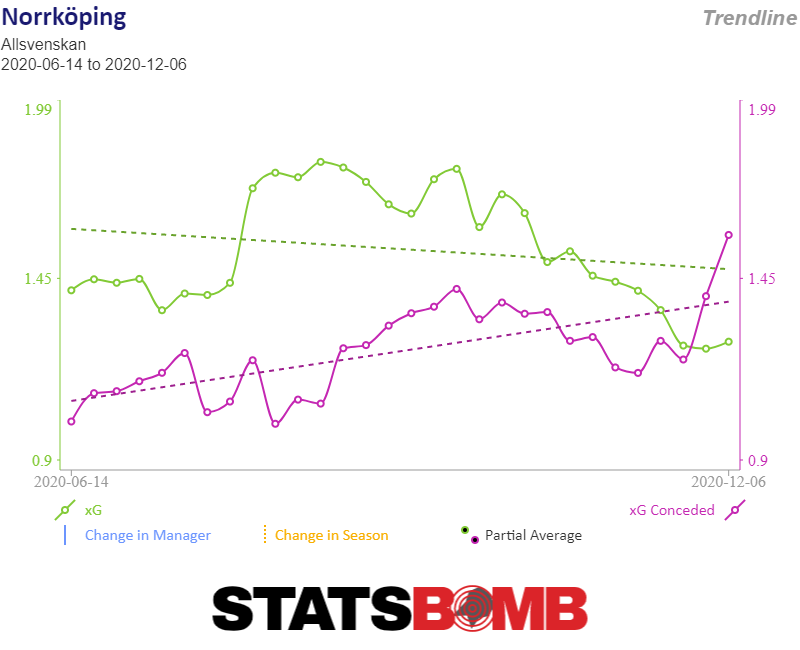
Malmö took full advantage. New manager Jon Dahl Tomasson’s reign had begun steadily and they sat seven points behind Norrköping after that eight game period due to a 3-4-1 start to the season. But, just as Norrköping’s engine faltered, Malmö went pedal-to-the-metal, winning their next eight fixtures in a row to ascend to the top of the table.
The approach in those wins was apparent as Di Blåe imposed their game on the opposition, defending further up the pitch and playing as much of the game in opposition territory as possible. Their Defensive Distance – the average distance from a team’s own goal from which it makes defensive actions – was 53.4 metres through this period, much higher than their average of 49.4 metres across the full season. That was matched by an aggressive press; Malmö recorded 629 pressures in the opposition half through this eight game spell, the highest in the Allsvenskan, and their ratio of pressures in the opposition half versus their total pressures of 59% was also a league-high.
The opening goal of their July fixture away to Östersund set the tone in this regard. As Östersund tried to play out from the back, Malmö formed a very high block and forced the home side to play a rushed clearance to the halfway line. Centre-half Oscar Lewicki made the interception and a string of quick, forward passes saw Ola Toivonen finish a Marcus Antonsson cutback unmarked 12-yards out, just seven seconds after the turnover.
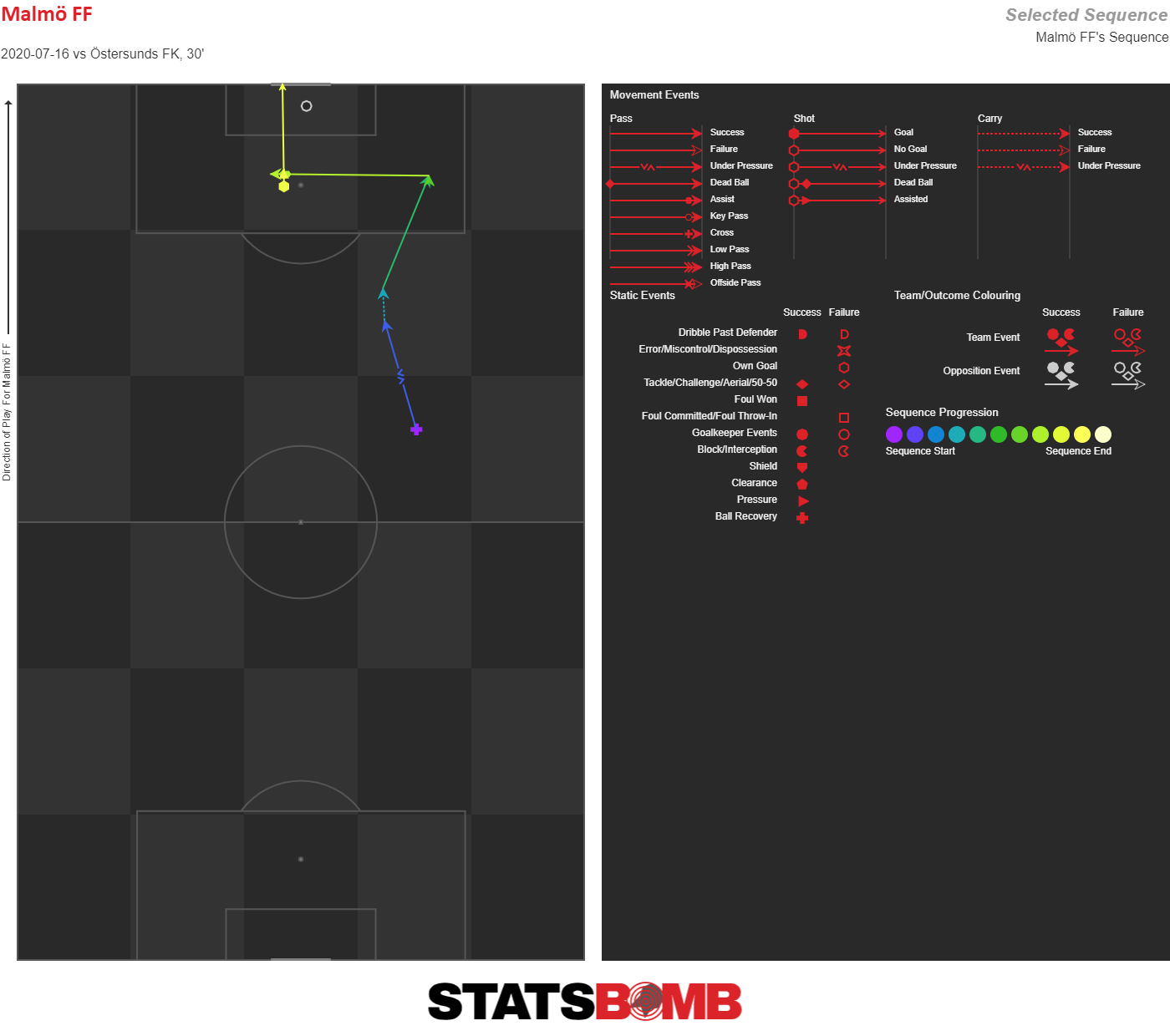
That run of form saw them move into top spot after gameweek 13, a position they would hold onto for the rest of the season in a dominant campaign. They went the entire season unbeaten at the Eleda Stadion, taking 11 wins and 4 draws from their 15 home fixtures, and a goal difference of +34 was more than twice the value of the next best goal difference in the league. Of course, a well-rounded side wouldn't be complete without a solid record from set-plays too; Malmö netted the most set-play goals in the league and also had the joint-best goal difference in this phase of the game.
2019 Allsvenskan 'Midfielder Of The Year' Anders Christiansen retained his title after another season of commanding performances in the middle of the Malmö midfield, and went one better in 2020 to claim the league’s 'Most Valuable Player Of The Year' award for the season too. The Dane was a key contributor on both sides of the ball but his ability to knit defence to attack in particular was crucial in the club’s 21st Allsvenskan title win.
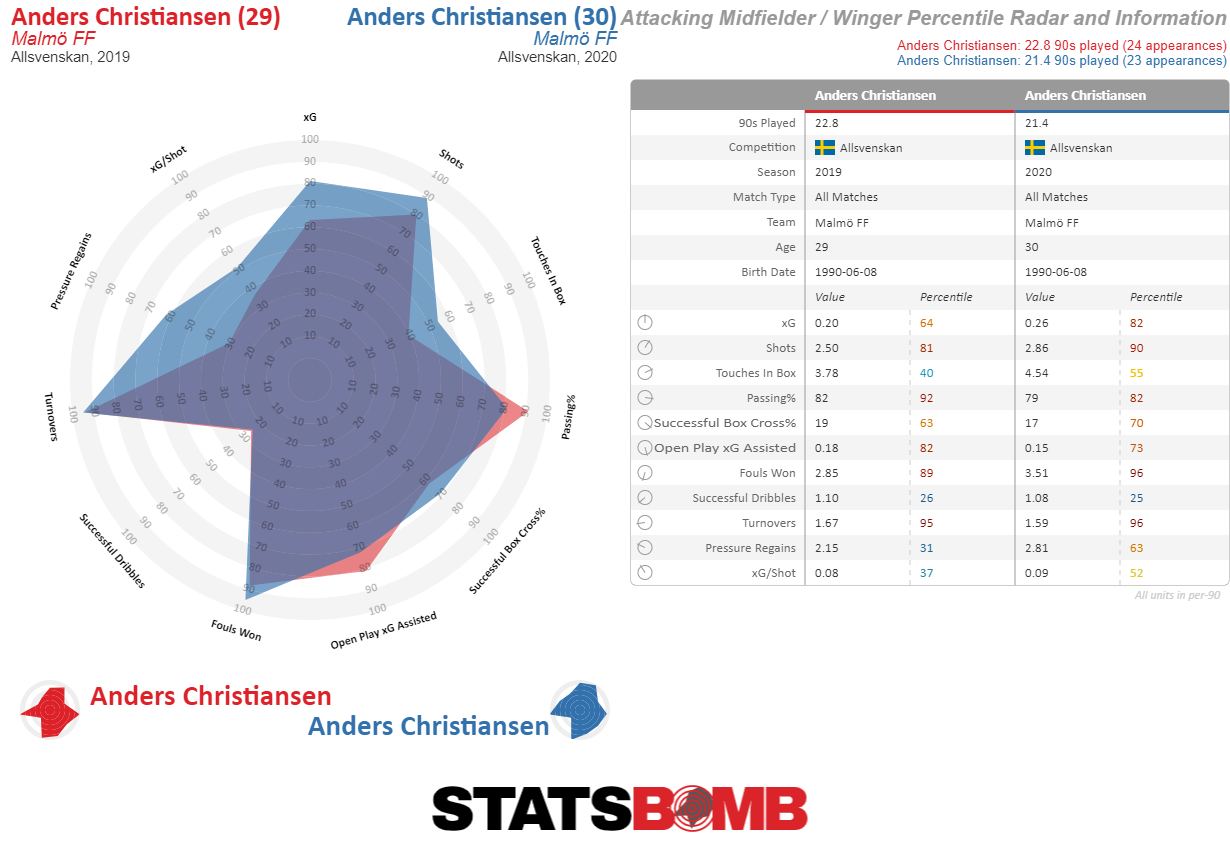
In the battle for European qualification, IF Elfsborg and BK Häcken edged out Djurgården to finish 2nd and 3rd respectively and enter the 2021/22 UEFA Europa League competition.
Djurgården, Allsvenskan Champions in 2019, finished just 1 point behind Häcken and might be frustrated not to have secured a top three finish on the back of some very robust defensive performances. Their 25.8 expected goals conceded, not including penalties, was the best record in the division by this metric, whilst their 0.08 xG per shot conceded ranked 2nd best, reflecting their ability to stifle the opposition from creating quality chances. It was underperformance at this end of the pitch, conceding 31 goals, that ultimately cost them a European qualification spot.
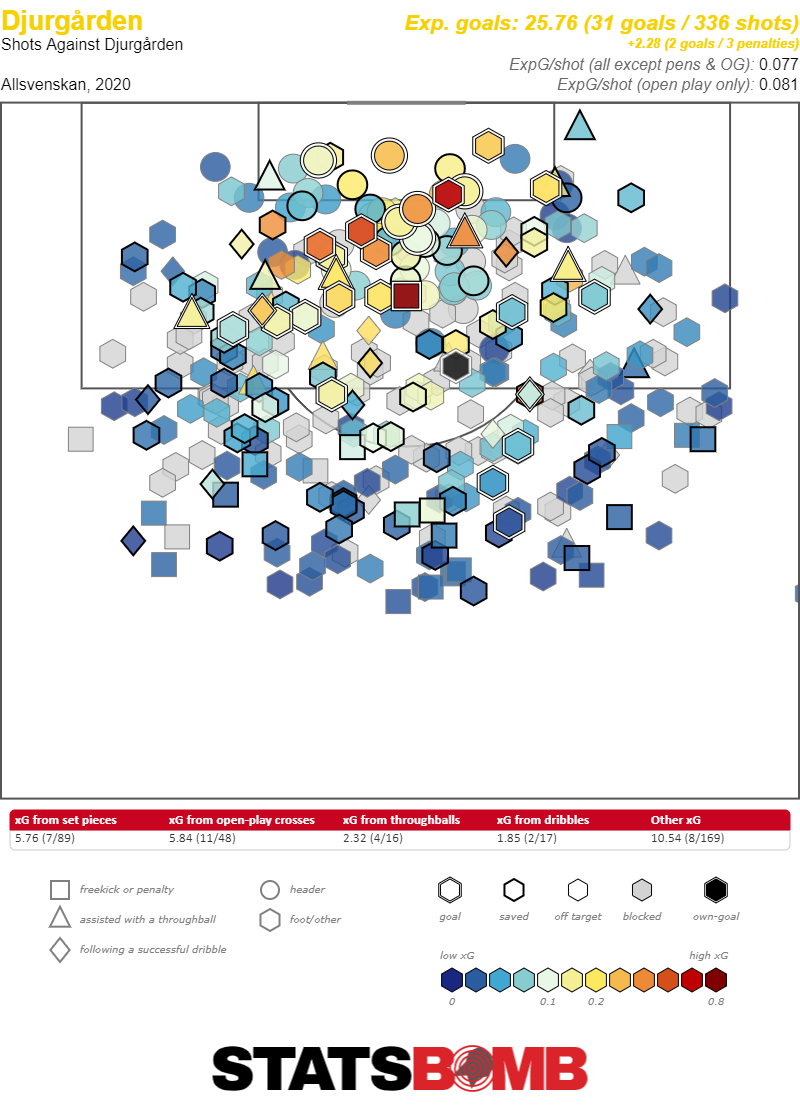
Runners-up Elfsborg had many of the league’s standout performers. Per Frick worked hard up front allowing Rasmus Alm and Simon Olsson to flourish behind him, while Johan Larsson was also a key contributor from right back, finishing as the club’s top assist-maker with 6 having registered both the most Key Passes in the league and the most xG assisted.
It was Allsvenskan 'Forward Of The Year' Jesper Karlsson who stole the show for Di Gule though, his performances on the wing earning him a September transfer to AZ Alkmaar in the Eredivisie.
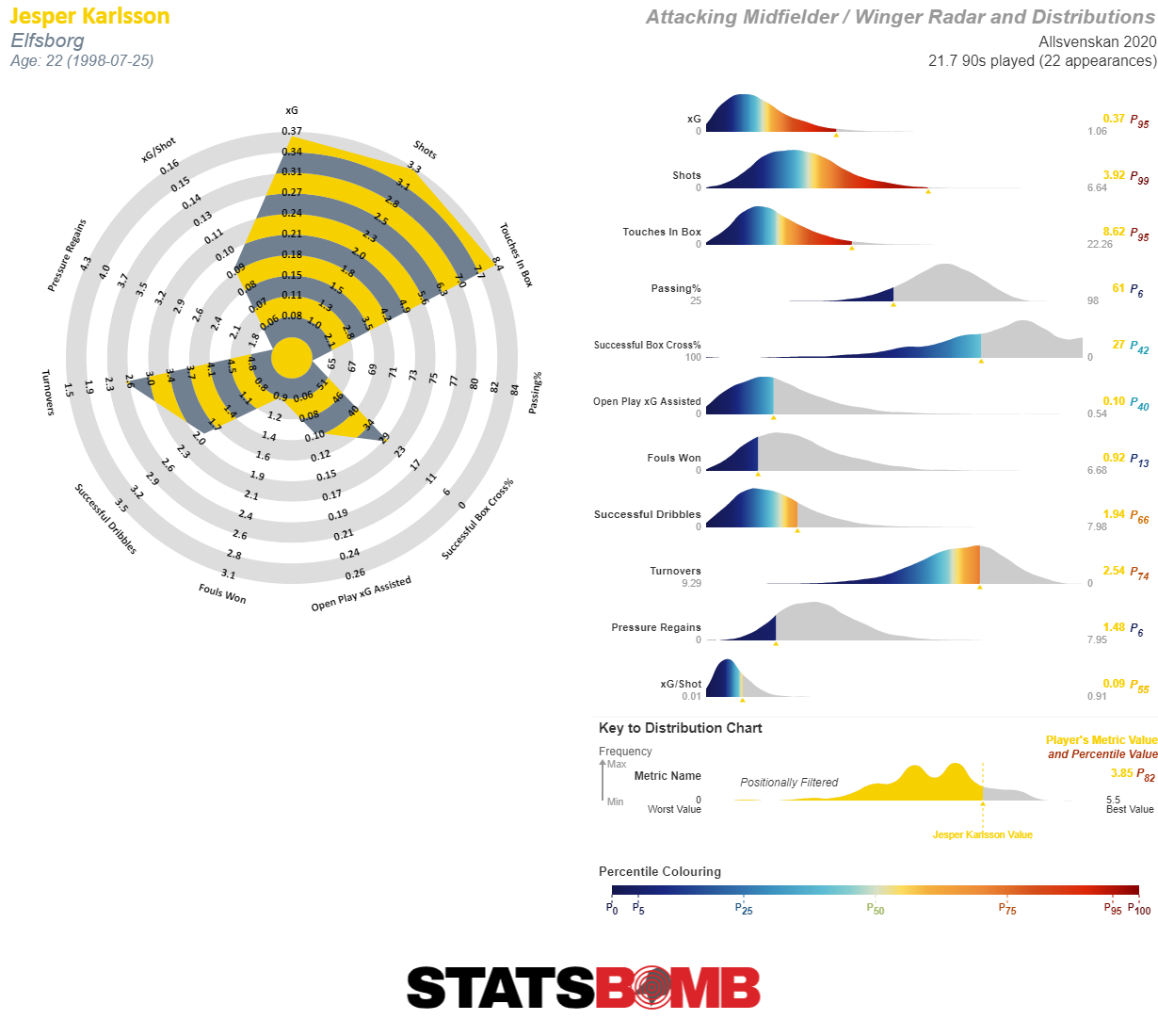
3rd place was BK Häcken’s highest placing since the 2012 season and their front-foot approach was central to their success. The Gothenburg side repeatedly showed their ability to quickly create shots off turnovers as they ranked joint-2nd for High Press shots - shots generated within 5 seconds of a defensive action in the opposition half - and tied it together effectively with their direct approach in transition, creating the most shots from counter attacks in the league.
Star player Daleho Irandust was central to this approach as his driving runs through the centre of the Bravida Arena pitch to carry Häcken into the attacking third were a regular sight, and his creativity in the final third saw him accrue the 2nd-most xG assisted from open play across the entire Allsvenskan. His high output in this area was a sizeable reason why he was recently identified as having a similar style to Atalanta keystone Papu Gómez by the Similar Player Search tool in our IQ platform.
As exciting as it was at the top, some of the brighter storylines were to be found further down the league table. To say that newly-promoted Mjällby adapted to their new surroundings with ease to stay up comfortably would be an understatement. Returning to the top flight after their 2014 relegation, the Hällevik-based club finished 5th, a club record, and their tally of 47 points was only four behind runners-up Elfsborg at the close of play.
It was a combination of deep defending and wise shot selection that powered the surprise package to their lofty position: up front the side paired the 3rd-best xG per shot with the 3rd closest average Shot Distance, taking the fewest shots from outside the box in the process. At the back, the team combined the 2nd highest Passes Per Defensive Action with the lowest percentage on StatsBomb’s Aggression metric at 17% (the proportion of an opponent’s pass receipts that are tackled, fouled or pressured within 2 seconds), prioritising their defensive shape over engaging the opposition.
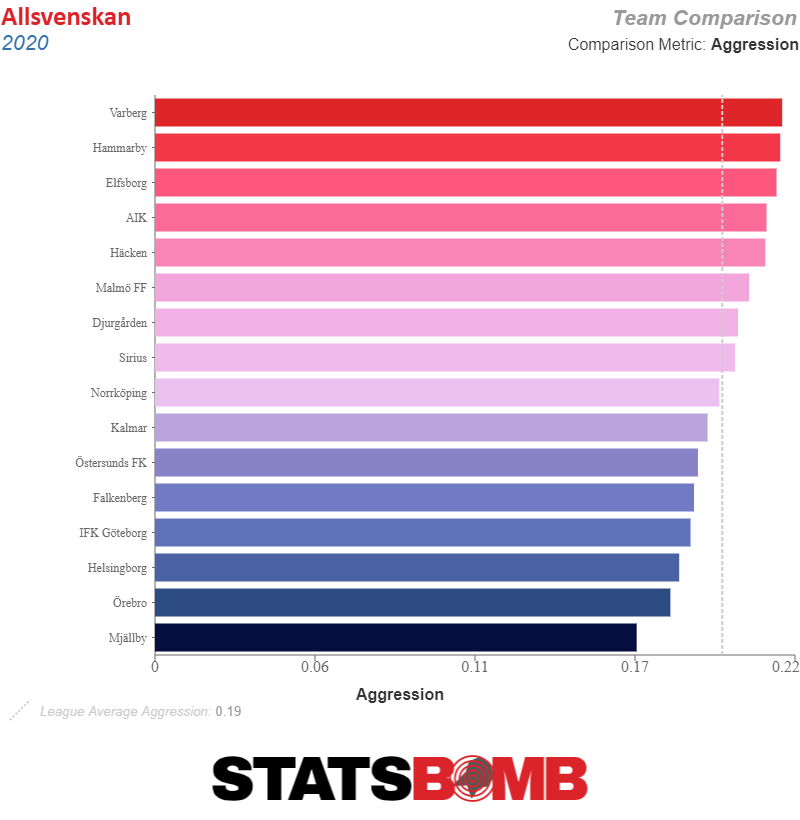
Which brings us to Varbergs BoIS.
Promoted alongside Mjällby and themselves making their debut in the Swedish topflight, the West Coast side led by Joakim Persson took a different approach to that of their fellow Allsvenskan newcomers. While Mjällby were happy to sit in their shape out of possession, Varberg were much more proactive in their defensive approach and recorded the most Pressures as a team in the 2020 Allsvenskan season, actively engaging the opposition across virtually the entire pitch.
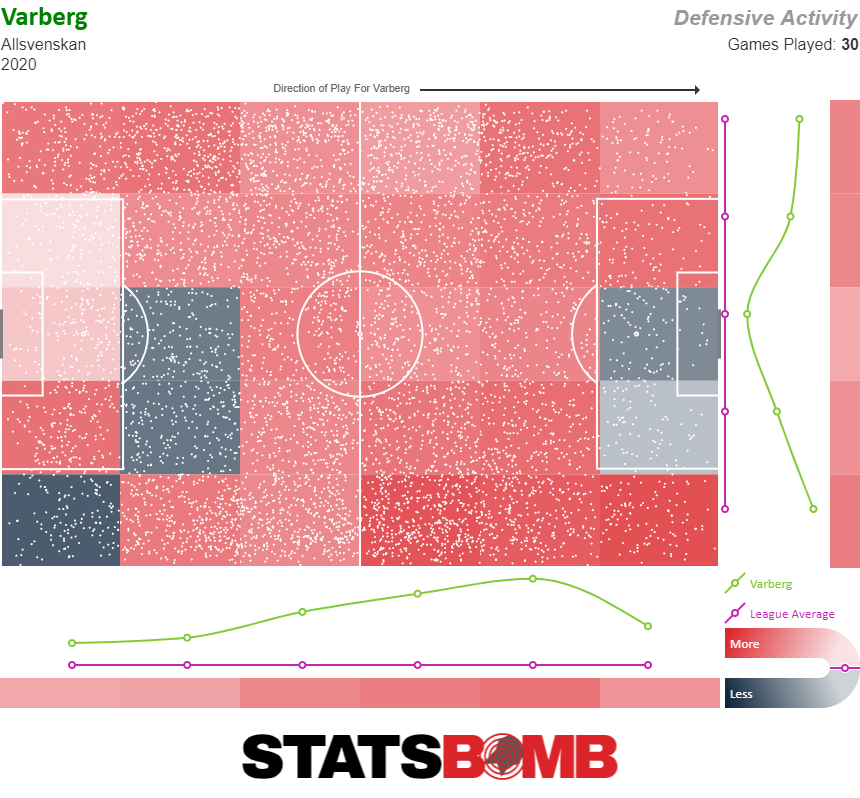
Star of the show for 7th-placed Örebro was undoubtedly goalkeeper Oscar Jansson, whose efforts were recognised with a 'Goalkeeper Of The Year' award. Örebro finished the season with a -4 goal difference, but with a -16.8 expected goal difference (including penalties). Such a large discrepancy wasn't solely down to Jansson's heroics, but the data still shows the former Tottenham Hotspur 'keeper to be a worthy winner of the award: StatsBomb data ranked Jansson as having the 2nd best Shot Stopping %, relative to the quality of the shots he faced, in the league, as well as ranking 2nd in StatsBomb's "Claimable" metric, a measure of how likely a goalkeeper is to claim a "claimable" pass.
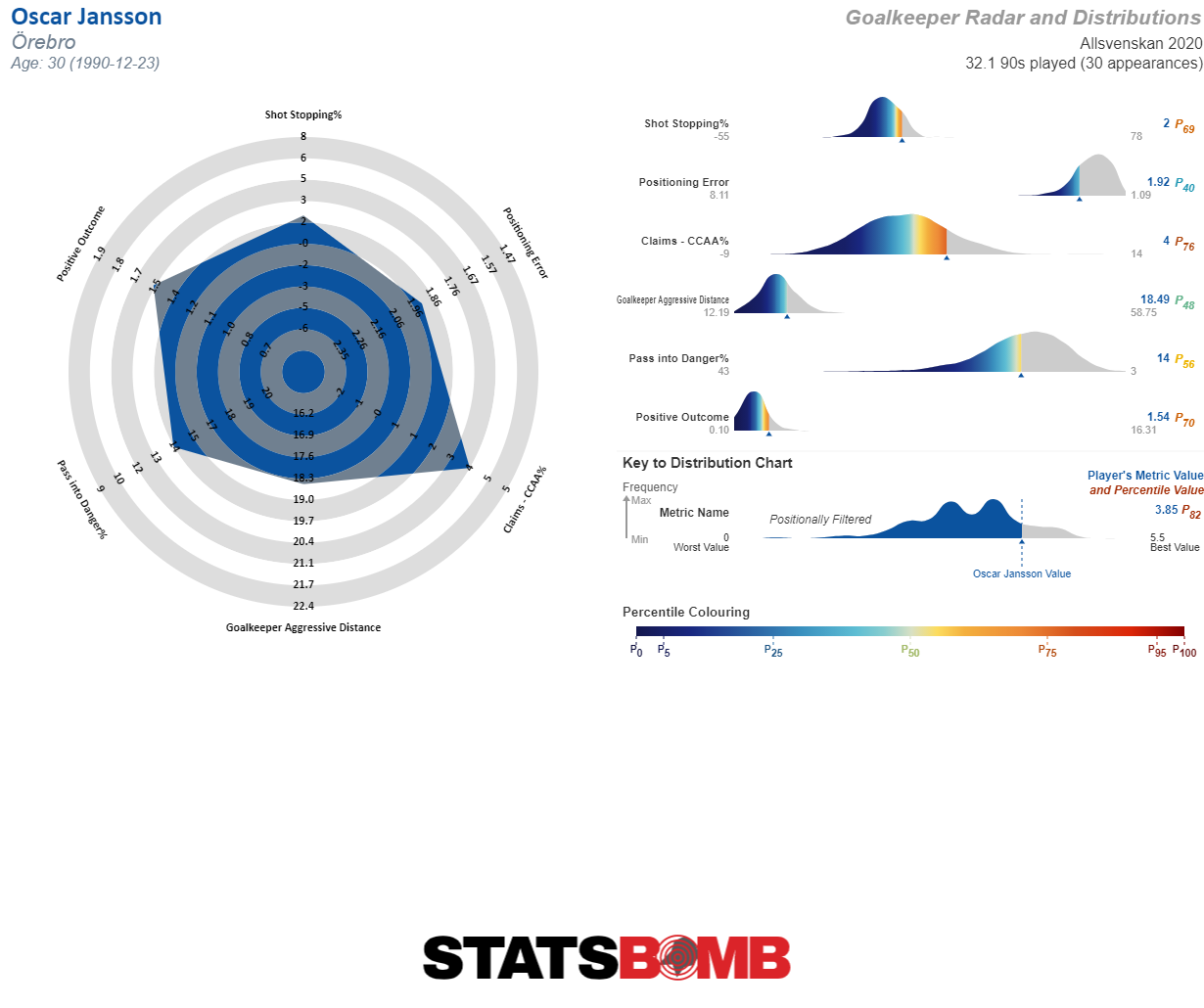
At the bottom of the table, a three-horse relegation battle was eventually won by Kalmar, consigning Helsingborg and Falkenberg to the 2021 Superettan. Kalmar’s defence-first approach in the final few weeks of the season saw them keep four clean sheets and pick up nine points from their final six games to overtake their rivals at the bottom of the table, having sat bottom of the league as late as gameweek 26.
Their penultimate fixture away at AIK was the key result, an 83rd minute Erik Israelsson goal from a corner securing a win that, combined with Helsingborg’s draw with Falkenberg, confirmed that Kalmar would avoid automatic relegation.
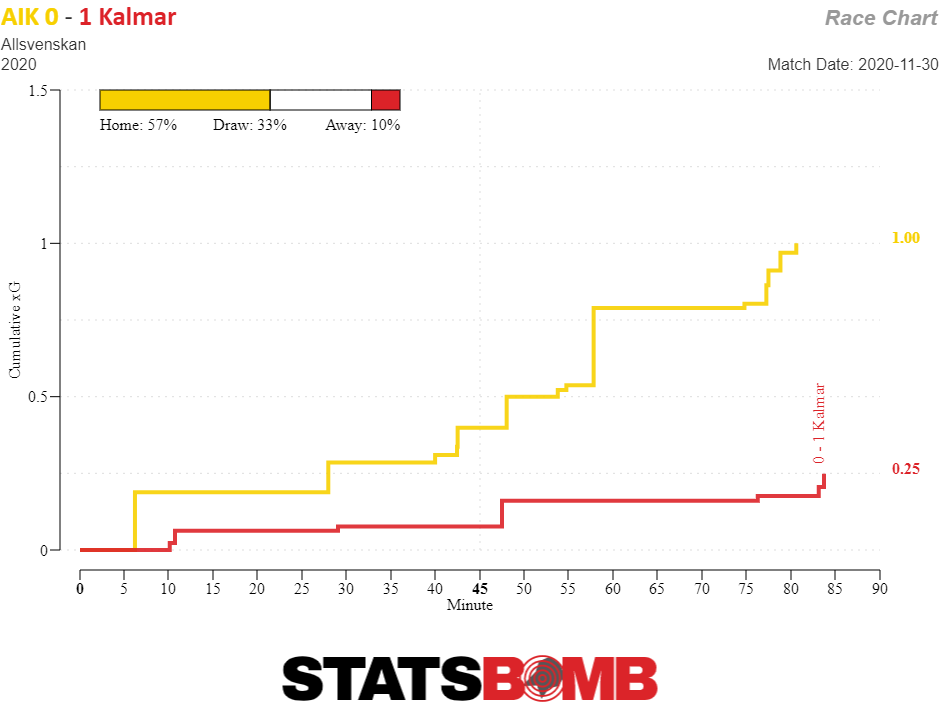
Their 2021 Allsvenskan place was finally confirmed after a 4-1 aggregate victory in the relegation/promotion play-off over Superettan’s 3rd-placed side Jönköpings Södra. With Helsingborg and Falkenberg dropping a division, their places will be taken in the 2021 Allsvenskan by Superettan champions Halmstads BK and runners-up Degerfors in what promises to be another lively campaign.
If you are a club, media or gambling entity and want to know more about what StatsBomb can do for you, please get in touch.
